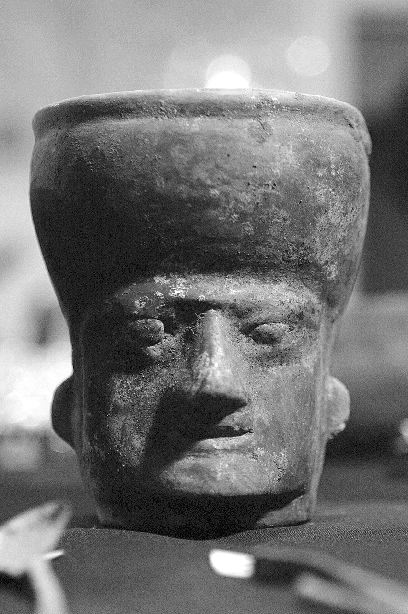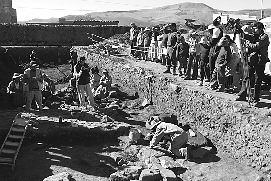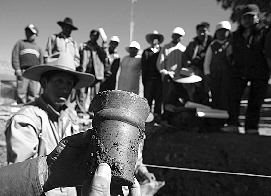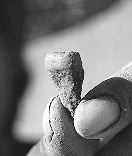Ancient ruins found in Bolivia
Some relics from little-known Andean culture 3,000 years old
July 10, 2008 - Vancouver
Sun (Reuters)
David Mercado, Reuters
COPACABANA, Bolivia -- Archeologists have begun digging at an ancient ceremonial site in eastern Bolivia to piece together the rites and daily life of cultures dating as far back as 3,000 years ago.
Locals stumbled upon the remains while clearing the ground to build a new market in the picturesque town of Copacabana, a tourist hotspot on the shores of Lake Titicaca.
 (left) A piece of ceramic from the Tiawanacu culture
is part of an archeological find in downtown Copacabana. Archeologists
have begun digging at an ancient ceremonial site in eastern Bolivia to
piece together the rites and daily life of cultures dating as far back
as 3,000 years. (Photo: David Mercado, Reuters)
(left) A piece of ceramic from the Tiawanacu culture
is part of an archeological find in downtown Copacabana. Archeologists
have begun digging at an ancient ceremonial site in eastern Bolivia to
piece together the rites and daily life of cultures dating as far back
as 3,000 years. (Photo: David Mercado, Reuters)
Many of the unearthed tombs, textiles, clay pots and jewelry belonged to the well-documented Tiwanaku and Inca cultures that populated the area hundreds of years ago.
But some relics go back as far as 3,000 years, when a little-known religious tradition called Yayamama is thought to have flourished in the Andes.
"They carved sculptures [in stone] with a man on one side and a woman on the other," said archeologist Sergio Chavez, who works for Central Michigan University.
The sculptures, which also feature two-headed snakes and geometric shapes, are still revered by local indigenous groups.
The Yayamama built a series of small temples by the lake, each two hours by foot from the other, Chavez told Reuters.
Wearing an Indiana Jones-style fedora hat, Chavez said he will study the stratified remains to try to better understand how different Andean cultures evolved.
 (right)
People watch as archeologists work at an ancient ceremonial site in downtown
Copacabana.
(right)
People watch as archeologists work at an ancient ceremonial site in downtown
Copacabana.
(Photograph by : David Mercado, Reuters)
"Starting from the oldest period, we have the Yayamama. And gradually we have ... the Tiwanaku some 1,000 years ago, the Inca, the colonial period, the hacienda era, [and] the republic," said Chavez, a Peruvian, sitting amid dozens of tattered clay objects in his shack-like field lab.
Outside, a group of Aymara Indians whom Chavez trained cleared the earth around tombstones and large clay pots in search of small artifacts.
 (right) A piece of ceramic from the Tiwanaku culture. Locals stumbled
upon the remains while clearing ground for a new market. (Photograph by
: David Mercado, Reuters)
(right) A piece of ceramic from the Tiwanaku culture. Locals stumbled
upon the remains while clearing ground for a new market. (Photograph by
: David Mercado, Reuters)
"There's a lot to be proud of in here, and we have to find our identity in these things. To understand the present and plan for the future, we have to look at the past," he said.
But the U.S.-trained archeologist said not everyone in Copacabana, near the border with Peru, is as excited about the past as he is.
Locals are determined to finish the construction of the market they started in June, and Chavez said he feels rushed.
 (left)
This dental piece was one of the archeological works found in Copacabana,
Bolivia. (Photograph by : David Mercado, Reuters)
(left)
This dental piece was one of the archeological works found in Copacabana,
Bolivia. (Photograph by : David Mercado, Reuters)
"We've had to work really hard to show the architecture, the remains,
so people realize that they have a huge cultural value," he said.
© The Vancouver Sun 2008